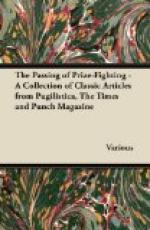[Illustration: “THE PEACE OF THE VALET IS FLED.”]
* * * * *
SONGS FOR THE SENTIMENTAL. — NO. 6.
Thou hast humbled the proud,
For my spirit hath bow’d
More humbly to thee than it e’er
bow’d before;
But thy pow’r
is past,
Thou hast triumph’d
thy last,
And the heart you enslaved beats in freedom
once more!
I have treasured
the flow’r
You wore but an
hour,
And knelt by the mound where together
we’ve sat;
But thy-folly
and pride
I now only deride—
So, fair Isabel, take your change out
of that!
That I loved, and how well,
It were madness to tell
To one who hath mock’d at my madd’ning
despair.
Like the white
wreath of snow
On the Alps’
rugged brow,
Isabel, I have proved thee as cold as
thou’rt fair!
’Twas thy
boast that I sued,
That you scorn’d
as I woo’d—
Though thou of my hopes were the Mount
Ararat;
But to-morrow
I wed
Araminta instead—
So, fair Isabel, take your change out
of that!
* * * * *
THE LAST HAUL.
The ponds in St. James’s Park were on last Monday drawn with nets, and a large quantity of the fish preserved there carried away by direction of the Chief Commissioner of Woods and Forests. Our talented correspondent, Ben D’Israeli, sends us the following squib on the circumstance:—
“Oh! never more,” Duncannon
cried,
“The spoils of place
shall fill our dishes!
But though we’ve lost the loaves
we’ll take
Our last sad haul amongst
the fishes.”
* * * * *
GENERAL SATISFACTION.
Lord Coventry declared emphatically that the sons, the fathers, and the grandfathers were all satisfied with the present corn laws. Had his lordship thought of the Herald, he might have added, “and the grandmothers also.”
* * * * *
ADVERTISEMENT.
If the enthusiastic individual who distinguished himself on the O.P. side of third row in the pit of “the late Theatre Royal English Opera House,” but now the refuge for the self-baptised “Council of Dramatic Literature,” can be warranted sober, and guaranteed an umbrella, in the use of which he is decidedly unrivalled, he is requested to apply to the Committee of management, where he will hear of something to his “advantage.”
* * * * *
[Illustration]
“PUNCH’S” LITERATURE.
I. “The Hungarian Daughter,”
a Dramatic Poem, by George Stephens,
8vo., pp. 294.
London: 1841.
II. “Introductory(!) Preface to the above,” pp. 25.




